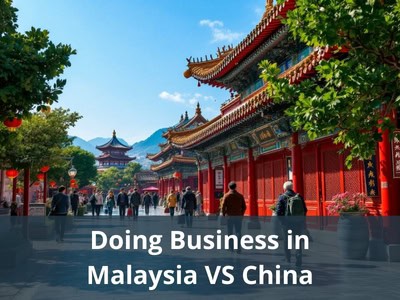Doing Business in Malaysia VS China – A Comparison
 Entrepreneurs exploring opportunities in Asia often compare Malaysia and China. Both countries offer distinct advantages and challenges. Malaysia stands out for its cost-efficiency, pro-SME support, and simplified setup process for foreign businesses. China is known for its massive consumer base, advanced infrastructure, and manufacturing dominance. This article provides a direct comparison to help you determine the right destination for your business goals.
Entrepreneurs exploring opportunities in Asia often compare Malaysia and China. Both countries offer distinct advantages and challenges. Malaysia stands out for its cost-efficiency, pro-SME support, and simplified setup process for foreign businesses. China is known for its massive consumer base, advanced infrastructure, and manufacturing dominance. This article provides a direct comparison to help you determine the right destination for your business goals.
Key Comparison Points
Business Environment
- Malaysia: Malaysia offers a stable, transparent business environment. Government support for digital and SME growth is well-established, with oversight by the Companies Commission of Malaysia (SSM).
- China: China presents a highly competitive market with opportunities across multiple sectors. However, foreign businesses may face regulatory complexities, licensing barriers, and IP concerns.
Taxation
- Malaysia: Malaysia has a corporate tax rate of 24%, and most capital gains are exempt. Incentives are available for specific sectors. See this Malaysia company registration guide for more.
- China: China imposes a standard corporate tax rate of 25%. Tax policies vary by region and industry, and foreign firms may qualify for incentives through Free Trade Zones.
Ease of Company Incorporation
- Malaysia: Company setup is fast and digital through MyCoID. Most sectors allow 100% foreign ownership. You can learn more about company incorporation in Malaysia or explore company incorporation services for professional support.
- China: Company registration in China is possible but more complex. It involves licensing, capital requirements, and approvals from multiple government departments.
Cost of Living and Business Operations
- Malaysia: Malaysia is affordable for startups and SMEs. Office space, labor, and living costs are low. This makes setting up businesses in Malaysia attractive for lean operations.
- China: Business costs are higher in Tier 1 cities like Beijing and Shanghai. However, lower-tier cities offer more affordable options and targeted incentives.
Access to Markets
- Malaysia: Malaysia provides access to ASEAN and global markets through trade agreements like RCEP and CPTPP. For setup support, visit 3E Accounting and explore our services.
- China: China gives access to its massive domestic market and serves as a global export hub. However, rising costs and policy shifts have led some companies to diversify.
Quick Comparison Overview
Here’s a quick overview of the key differences for easy reference.
| Factor |
Malaysia |
China |
| Business Environment |
Stable, SME-friendly, digitally integrated |
Massive market, regulatory complexity |
| Corporate Tax Rate |
24% |
25% |
| Capital Gains Tax |
Generally not applicable |
Applicable under certain conditions |
| Ease of Incorporation |
Digital, fast, foreigner-friendly |
Multi-step, region-based approvals |
| Business Costs |
Low operational and living costs |
High in Tier 1 cities, lower in smaller cities |
| Market Access |
ASEAN, CPTPP, RCEP markets |
Large domestic market, strong global exports |

Benefits of Choosing 3E Accounting
Selecting the right partner is crucial when it comes to starting a business in Malaysia. At 3E Accounting, we offer a comprehensive range of solutions designed to simplify the entire process of company incorporation in Malaysia. From ensuring compliance with local regulations to providing expert guidance tailored to your specific needs, we make the journey seamless.
For entrepreneurs looking to navigate Malaysia company registration or explore company setup in Malaysia, our team provides unmatched expertise and support. Additionally, our company incorporation services are tailored to help you succeed in the competitive business environment.
With a deep understanding of the region’s business landscape, we also provide resources for setting up businesses in Malaysia, ensuring that every step is clear and efficient. Whether you need assistance with corporate secretarial or company secretary services, we are here to help.
To explore our services or discuss your business needs, contact 3E Accounting. With our strong presence in Malaysia and a proven track record, we are your trusted partner for success in Asia.
Ready to Expand into Malaysia? Choose 3E Accounting Today!
Stay Secure, Stay Successful With 3E Accounting Services
Contact Us Now
Frequently Asked Questions
Malaysia offers lower startup costs, simpler regulations, and a faster digital incorporation process. Refer to this guide to starting a business in Malaysia to explore why it’s a top choice for many foreign investors.
Malaysia uses the MyCoID system for digital registration and allows full foreign ownership in many sectors. China’s process is more manual and often requires multiple government approvals. See this full Malaysia company registration guide.
Malaysia charges a 24% corporate tax and generally has no capital gains tax. China has a 25% corporate tax and applies capital gains taxes depending on asset type and region.
Abigail Yu oversees executive leadership at 3E Accounting Group, leading operations, IT solutions, public relations, and digital marketing to drive business success. She holds an honors degree in Communication and New Media from the National University of Singapore and is highly skilled in crisis management, financial communication, and corporate communications.



